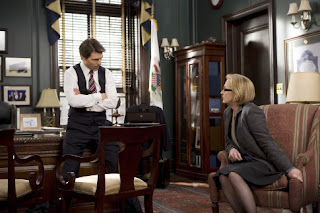The second half of the evening was only 88 minutes long and centred around Screen One in the Strand Cinema just across the road. (The floor in the cinema wasn’t sticky by the way ... things are looking up for the Strand.)
Directed by Robert Redford, Lions for Lambs opened UK wide today. It’s a film that rotates between three linked stories.
- East Coast US / There’s an ambitious Senator (played by Tom Cruise) who is briefing a veteran TV reporter Janine Roth (Meryl Streep) in his air-conditioned office about his bold new military campaign (more like a giant game of Risk) in Afghanistan. He wants the media to tell his story of “forward operating points” and “not defending democracy through non-violent action” in order that there will be “the public will to win”.
- Afghanistan / There’s the Special Services soldiers being helicoptered at night into position to capture a high peak before the Al-Qaeda enemy. But their flight comes under enemy fire: Arian (Derek Luke) and Ernest (Micharl Peña) fall to the snowy ground. They joined the army so they would be involved at the centre of the world’s issues, so they could come back and change things.
- West Coast US / There’s an early morning motivational talk between Prof Malley (played by Redford) and his disaffected political science student Todd (Andrew Garfield). Malley is a liberal idealist, who sees potential in Todd but wants to challenge his lack of engagement and real-world experience. Todd sees that political science is all about the winning and not about the governing. What’s the point?



The film begins with a military leader remind his troops of the rule:
“... never engage your enemy for too long ... or they will adapt to your tactics”
And the same could apply to the US media. They too can be played by the political masters who have learned how to tickle their tummies and make them cooperate. But Janine Roth isn’t any more convinced by the Senator Irving’s rhetoric than she is by the photographs hanging on the walls of his office (Irving + Bush, Irving + Condi, Irving + Powell, etc).
She wants to tell a different story. One that looks back at history, reflects and learns from it. (Seems fitting that on this weekend of remembrance, and as Northern Ireland specifically revisits Enniskillen twenty years on, there’s plenty in our history that needs to be remembered and not forgotten.)
Her TV network swallowed the pre-Iraq war facts, to their later regret. They didn’t “connect the dots” and she doesn’t want them to fall into that trap again. But at her stage of career, with her caring responsibilities, hasn’t she been chosen for this “gift” of an exclusive briefing because she is vulnerable and can’t risk not running the story?

Prof Malley has identified students with potential before. But lighting the fire under his prize students has sent some off in directions he hasn’t fully approved off. Rather than heading into deliberate social action, or political campaigning, some have surprisingly taken the military route. But tellingly, the pictures on his office walls are of family, not power.
As the film explores the triangular relationship between the characters in the three locations, it’s possible (but I think too facile) to immediately write it off as a terribly balanced explanation of the Republican and Democrat set piece positions.
- An Iraq apologist whose idea of doing “whatever it takes” might even stretch to taking the nuclear toys out of their boxes.
- A radicalising academic liberal who thinks that it’s important that we reduce the distance between ourselves and reality, that it’s better to fail trying than sit back, earn lots of money and opt out of responsibility.
- And two soldiers whose acceptance of fate betrays their personal ambitions.
There are probably more words in this film than all the other films playing at the Strand! If you cut out the battle scene, you could turn it into a stage play. But for all it’s oratory and argument, the film still ends unresolved.

Is the senator really more powerful than the Secretary for Defense? And so ambitious? Yup.
Will the reporter go with her instinct or her job security? Ummmm, not so sure. Are the media guilty of “following the majority” in their reporting? And does their eventual questioning of the saccharine-coated government propaganda cost service lives overseas?
Will the student turn his back on just having fun in the fraternity and set himself free as an adult in the world? I hope he does. Does the military’s manner of following other people’s orders neuter their individual ability to make a difference in the world? Oh, and what kind of senator has a trouser press in his office?
That just leaves the title of the film: Lions for Lambs.
Really should be called “Lions led on by asses”, but that would never get past the Hollywood censors! Wikipedia can be trusted (?) to explain how a phrase from the Crimean War was adapted to “lions led by donkeys” used to describe the brave British infantry (lions) of the World War One and to condemn the incompetent and indifferent generals (lambs) who commanded them”, before popping up again in this film.
Lions for Lambs is a story that challenges its audience to engage and not just be taken along for the ride. Some reviewers didn’t like it, but I think it’s worth investing an hour and a half of your life to open your mind and think about how you could be earthed in reality.
Update: check out Guto Harri's review over on BBC News ... much better than reading my ramblings!
No comments:
Post a Comment